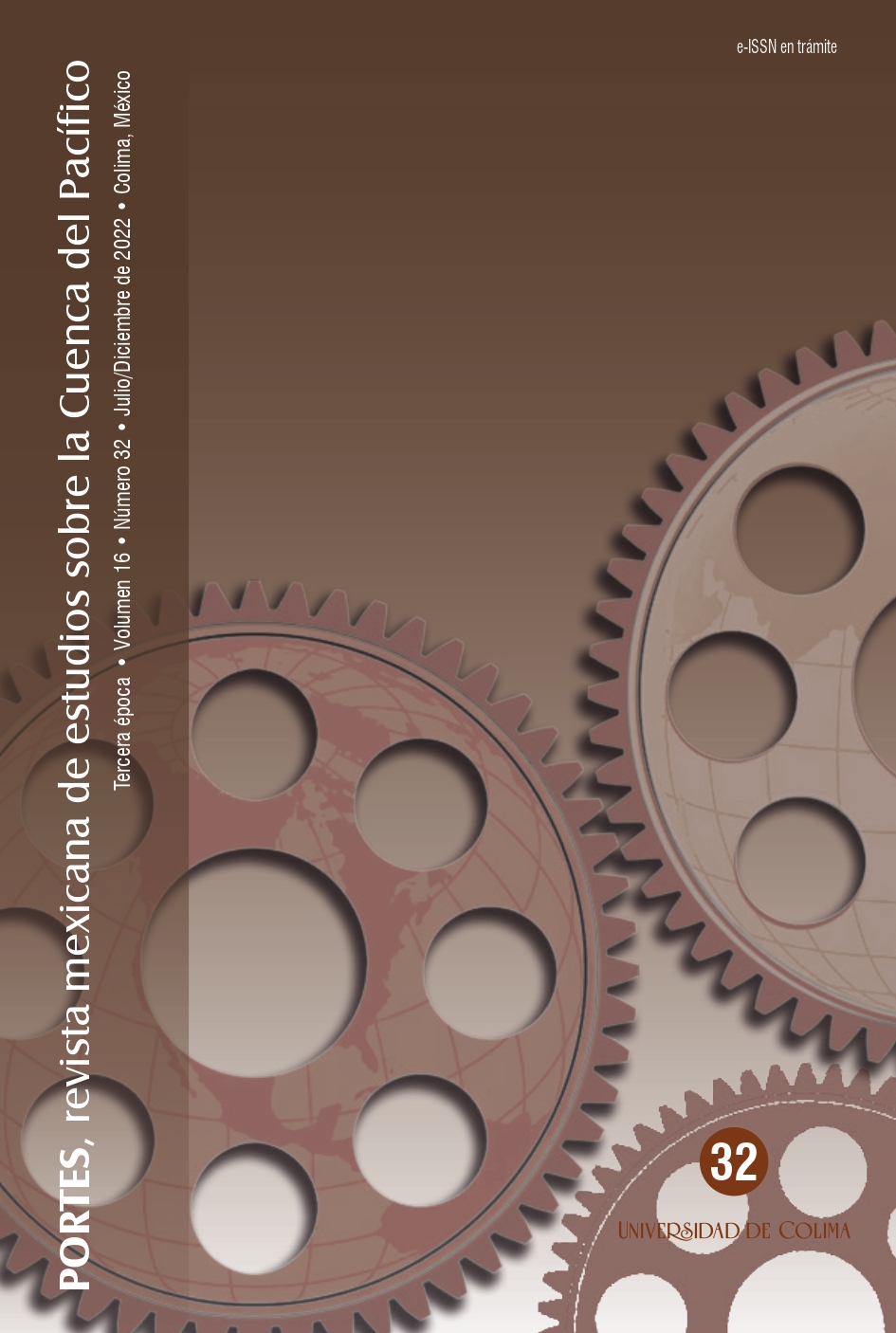Cultural diplomacy as a strategic tool of Chinese pragmatism and its influence in Mexicali, Baja California
Keywords:
Diplomacy, culture, migration, China, MexicaliAbstract
This article is the result of the thesis to obtain a bachelor's degree in international relations entitled “Influencia de la cultura china en la ciudad de Mexicali; migración y raíces históricas rumbo a la diplomacia cultural como herramienta estratégica del pragmatismo chino” FCSYP-UABC, 2021
The objective of the article is to analyze the influence of Chinese culture in the city of Mexicali through the evolution and integration of migrant population groups established from the founding of the city to the present day and if this is consistent with a macro strategy of the Chinese government in its policy of opening towards the outside and if it impacts the increase of cultural influence in the capital city of Baja California. The methodology is qualitative, documentary and historical analysis is used to describe the dynamics of migratory flows from China to Mexicali, BC. and to contextualize the evolution of Chinese foreign policy with an emphasis on cultural diplomacy using a synchronous cross-sectional analysis. Subsequently, cultural adaptations of Chinese migrants in the city are documented and the strategies of cultural diplomacy of this community and the congruence with Chinese foreign policy is analyzed, additionally the documentary information is contrasted with fi eld work through interviews with key actors of the Chinese community in Mexicali and historians.
Downloads
References
Cauich, F. (1998). La comunidad china en el estado de Sonora. La migración china a Sonora y a los Estados Unidos de América (18821934). (Tesis de licenciatura). México, UAM-I.
Cervantes, J. (22 de febrero del 2020). Autoridades de Baja California aseguran que Mexicali fue fundada por chinos. Proceso. https://www.proceso.com.mx/nacional/estados/2020/2/22/autoridades-de-baja-california-aseguran-que-mexicali-fue-fundada-por-chinos-238898.html
Cummings, M.C. (2003). Cultural Diplomacy and the United States Government: A Survey. Washington, D.C, Center for Arts and Culture.
Esteban, M. (2017). La política exterior de Xi Jinping tras el 19º Congreso: China quiere un papel central en la escena global. Real Instituto Elcano. http://www.realinstitutoelcano.org/wps/portal/rielcano_es/contenido?WCM_GLOBAL_CONTEXT=/elcano/elcano_es/zonas_es/ari80-2017-esteban-politica-exterior-xi-jinping-19-congreso-china-quiere-papel-central-escena-global
Fleischer, F. (2012). La diáspora china: un acercamiento a la migración china en Colombia. Revista de Estudios Sociales, 71-79.
Gómez, J. (1992). El movimiento anti chino en México (1871-1934). Problemas del racismo y del nacionalismo durante la Revolución Mexicana. México, INAH.
González, F.M (1990). El proceso de aculturación de la población de origen chino en la ciudad de Mexicali. Cuadernos de Ciencias Sociales 7, Mexicali, Universidad Autónoma de Baja California.
Guerra, C. (2010). La Diáspora China. En Consejo Argentino para las Relaciones Internacionales, (6), Buenos Aires.
Martínez, G. (2016). Síntesis 2015, Estadística Migratoria. Secretaría de Gobernación, INAMI. http://portales.segob.gob.mx/work/models/PoliticaMigratoria/CEM/Estadisticas/Sintesis_Graficas/Sintesis_2015.pdf
Pike, D. (1978). History of Vietnamese Communism, 1925-1976.
Stanford, California, Hoover Institute Press, No. 189.1978.
Retortillo, A. y Rodríguez, H. (2008). Inmigración, estrategias de aculturación y valores laborales: un estudio exploratorio. Revista de Psicología del Trabajo y de las Organizaciones, 24(2), 187-202. https://scielo.isciii.es/scielo.php?script=sci_abstract&pid=S1576-59622008000200004
Rodríguez, I. (2012). Convergencia de intereses políticos y estratégicos entre China y América Latina: periodo 2000-2010. Escenarios Actuales, CESIM, No 2, septiembre, 2012.
Rodríguez, I., y Leiva, D. (2013). El soft power en la política exterior de China: consecuencias para América Latina. Polis Revista Latinoamericana, (35). http://journals.openedition.org/polis/9179
Rodríguez Gómez, N. (2017). Papel de diplomacia cultural china en América Latina en el periodo 2008-2017. (Tesis de licenciatura). Universidad Javeriana, Facultad de Ciencias Políticas y Relaciones Internacionales, carrera de Relaciones Internacionales. Bogotá, Colombia.
Rodríguez, L. (2018). Inserción laboral y trayectorias de inmigrantes recientes de origen chino en Baja California, México. (Tesis de Maestría). El Colegio de la Frontera Norte. Tijuana, Baja California, México.
Ruskamp Jr., J. A. (2012). Asiatic Echoes: The Identi?cation of Ancient Chinese Pictograms in Pre-Columbian North American Rock Writing. Cambridge University Press, (1.a ed., Vol. 1).
Saddiki, S. (2009). El papel de la diplomacia cultural en las relaciones internacionales. CIDOB D’Afers Internacionals, (88), 107118.
Sornoza Parrales, G. I., Parrales Poveda, M. L., Sornoza Parrales, D. R., y Guaranda Sornoza, V. F. (2018). Reforma económica China: de economía planificada a economía de mercado. Revista Venezolana de Gerencia, 23(83), 521-529.
Sowell, T. (1996). Migrations and Cultures: A World View. New York: Basic Books.
Valdez, Y. (2019). Documental: “El legado de mi raza”. Chinos y mestizos en Mexicali. http://www.tusanaje.org/2019/08/09/documental-el-legado-de-mi-raza/
Velázquez, C. (2001). Los inmigrantes chinos en Baja California 19201937. Dimensión Antropológica. http://www.dimensionantropologica.inah.gob.mx/?p=2930
Villamizar, F. (2011). El soft power chino. Revista Enfoques: Ciencia Política y Administración Pública, IX(14), 75-88. https://www.redalyc.org/pdf/960/96019001004.pdf
Wang, G. (1991). Among Non-Chinese. Daedalus 120(2),135-157.
Downloads
Published
How to Cite
Issue
Section
License
Copyright (c) 2022 University of Colima

This work is licensed under a Creative Commons Attribution-NonCommercial-ShareAlike 4.0 International License.
La revista PORTES de la Universidad de Colima se distribuye bajo una Licencia Creative Commons Atribución-NoComercial-CompartirIgual 4.0 Internacional






